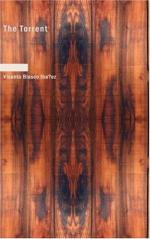Later she showed him some of her more personal mementoes; jewels of rare beauty, expensive baubles, “testimonials,” reminiscent of “evenings of honor,” when admirers had surprised her in the green room while outside the audience was applauding wildly, and she, lowering her lance, and surrounded by ushers with huge bouquets, would step forward to the footlights and make her bow of acknowledgment, under a deluge of tinsel and flowers. One medallion bore the portrait of the venerable don Pedro of Brazil, the artist-emperor, who paid tribute to the singer in a greeting written in diamonds. Gem-incrusted frames of gold spoke of enthusiasts who perhaps had begun by desiring the woman to resign themselves in the end to admiration for the artist. Here was a collection of illuminated diplomas from charitable societies thanking her for assistance at benefits. Queen Victoria of England had given her a fan with an autograph dated from a concert at Windsor Castle. From Isabel II came a royal bracelet, as a souvenir of various evenings at the Castilla Palace in Paris. Millionaires, princes, grand-dukes, presidents of Spanish-American republics, had left a whole museum of costly trinkets at her feet. Characteristic of adorers from the United States, where people always temper enthusiasm with usefulness, were a number of portfolios, their bindings much worn by time, containing railroad shares, land titles, stocks in enterprises of varying stability, suggesting the rambles of the American promotor from the prairies of Canada to the pampas of the Argentine.
In the presence of all the trophies that the arrogant Valkyrie had gathered in on her triumphal passage through the world, Rafael felt pride, first of all, at being friends with such a woman; but at the same time a sense of his own insignificance, exaggerating, if anything, the difference that separated them. How in the world had he ever dared make love to a person like Leonora Brunna?
Finally came the most interesting, the most intimate of all her treasures—an album which she allowed him hurriedly to glimpse through, forbidding him, however, even to look at certain of the pages. It was a volume modestly bound in dark leather with silver clasps; but Rafael gazed upon it as on a wonderful fetish, and with all the awe-struck adoration inspired by great names. Kings and emperors were the least among the celebrities who had knelt in homage before the goddess. The overshadowing geniuses of art were there, dedicating a word of affection, a line of verse, a bar of music, to the beautiful songstress. Rafael stared in open-mouthed wonderment at the signatures of the old Verdi and of Boito. Then came the younger masters, of the new Italian school, noisy and triumphant with the clamor of art brought within range of the mob. In gallant phrases the Frenchmen, Massenet and Saint-Saens, paid their respects to the greatest interpreter of the greatest of composers; Rafael could decipher what was in Italian, scenting




